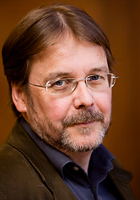
- Joep Leerssen (University of Amsterdam)
THE PHILOLOGICAL TURN AND THE NATION AS HYPHEN
There is something anachronistic in the relationship between literary theory and literary history. Theorists conceive of hybridity and the fluidity of identity-constructs as recent, postmodern insights, and by implication earlier stages of literary development are often conceived of as belonging to a monolithic, essentialist paradigm, and are either neglected or else represented only in those aspects which fit our contemporary prejudices.
The idea of constructed and hyphenated identities is at the core of the “philological turn” of the early nineteenth century. The idea that each nation develops its own literature, expressed in its own language from which the nation derives its cultural identity, emerges everywhere in
Europe in the decades around 1800, as part of a break-up of earlier classicist universalism, in which (as Borges phrased it) “the variety of periods and people is merely incidental”. Against the dominant backdrop of a classicist hypercanon and multi-ethnic empires, *all* vernacular literatures were considered demotic, hyphenated, hybrid.
I want to offer some considerations on the precise actual intellectual historical origin and discursive spread of this new paradigm from Giambattista Vico to F.A. Wolff and Jacob Grimm. In particular I want to draw attention to Grimm’s interest in Spanish romances, the Finnish Kalevala and the work of Vuk Karadzic, raising, ultimately, the question what it was that subsequently hardened his reputation and function into one of Germanic chauvinistic essentialism.

Universität Wien
Spitalgasse 2, Hof 3
1090 Wien
T: +43-1-4277-428 01 / +43-1-4277-428 91
F: +43-1-4277-9 428




